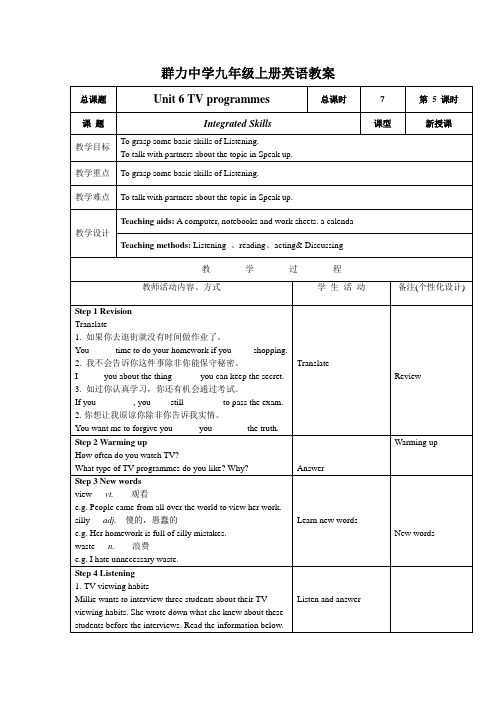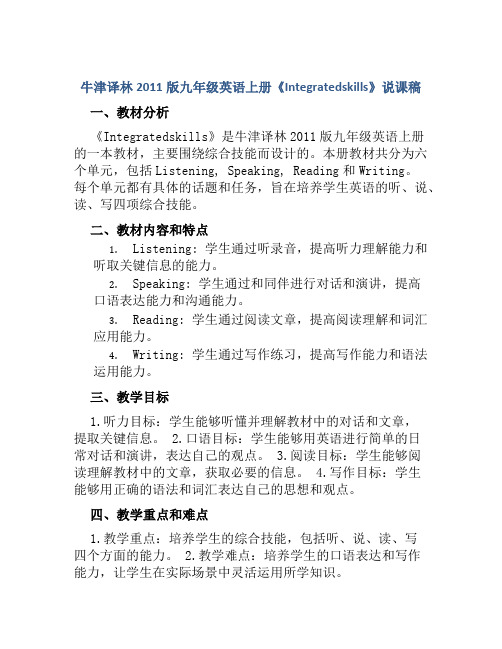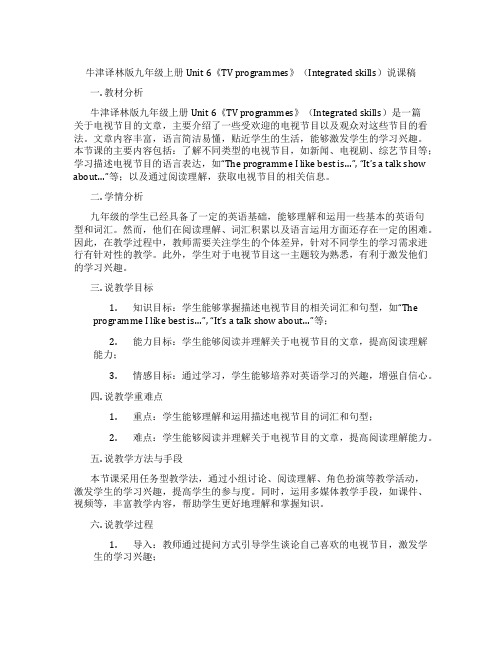牛津译林版-英语-九上-6单元 Integrated skills教学设计
九年级英语上册牛津译林版《Unit 6 TV Programmes Integrated Skills》教案

课题Unit 6 TV ProgrammesIntegrated Skills课题性质新授教学目标1.To identify the context of an interview and distinguish between three differentinterviewees.2.To identify main ideas and vocabulary and use this information to complete areport.教学重点Train the skills of listening .speaking. reading .writing教学难点Have an interview and complete a report教学过程:Step 1 Lead-in1. Show a music video to the students. Ask the students what TV programme it might be.Writedown as many programmes as you can2.Play a game and help the students review the TV programmes that they have learned in this unit.Step 2 Speak up1.Let the students listen to the conversation between Millie and Kitty. ask and answer thefollowing questions .A.Which TV programme does Millie like best?B.How long does Millie watch TV every day?C.Which TV programme does Kitty like best?D.How about Kitty?2.Let the students read after the conversation. And ask Which TV programme do you like best?And how long do you spend watching TV?Step 3 Practice1.Make conversations with some students as a model.e the conversation as a model , Let the students have a new conversation .Step 4 Listening1.Different people ’s favourite TV programmes are also different , Millie interviewed threestudents ,they are Anita, Philip and Sam . now let’s read the information about them in the form on P74 and have a guessing game .2.Ask the students to guess what their favourite TV programmes are.3.Let the students listen to the three interviews and find out what their favourite TV programmesare.4.listen to the three interviews one by one , try to finish part A2 .5.check the answers6.Ask the students to finish Millie’s report.7.check the answers and read the passage .Step 5 Interview and report1. Divide the students into groups of four. Everyone needs to have an interview with one student ofhis group.2Finish your interview as quickly as possible, and then go back to your seat to finish your report.Step 6 have a discussion1Some people think TV programmes can make us relax , it is useful ,but others don’t think so , please have a discussion ,tell the advantages and the disadvantages3.Achieve a balance between TV programmes and study !Homework1.Have an interview with your family members about their TV viewing habits and then write areport.2. Preview the Pronunciation part.评议意见教研组长(签名):。
牛津译林版九年级上册英语(新)教案9AUnit6Integratedskills

Millie: Why?
Simon: I think most of them are silly. Watching TV ads is just a waste of time.
Work in pairs
Act the dialogue out
Dialogue practice
Answer
Warming up
Step 3 New words
viewvt.观看
e.g. People came from all over the world to view her work.
sillyadj.傻的,愚蠢的
e.g. Her homework is full of silly mistakes.
Sam is a Grade (16) ___ student. He is a member of the (17)
___________. He likes (18) _____ programmes because he
thinks they are really (19) ____. His favorite programme is
Because she thinks some of them are really creative.
Answer
Answer
Speak up
Step 6 Dialogue practice
1. Work in pairs and tell your partner your point of view. Use the conversation as a model.
2. Millie is interviewing the students. Listen carefully and help her complete the notes below.
牛津译林版英语九上Unit 6《TV programmes》(Integrated skills)教

牛津译林版英语九上Unit 6《TV programmes》(Integrated skills)教学设计一. 教材分析《牛津译林版英语九上Unit 6 TV programmes》主要介绍了不同类型的电视节目。
本节课的主题与学生的生活紧密相连,有助于激发他们的学习兴趣。
教材包括不同类型的电视节目,如新闻、综艺节目、纪录片等,以及与电视节目相关的话题,如电视节目对人们的影响、如何选择电视节目等。
通过对这些话题的学习,学生可以提高自己的英语听说读写能力,同时培养自己的审美观和批判思维能力。
二. 学情分析学生在之前的学习中已经掌握了一定的英语基础,能够进行简单的英语交流。
但部分学生对于某些电视节目的类型和特点可能了解不多,因此在教学过程中需要引导学生进行观察、思考和讨论。
此外,学生可能对英语学习存在一定的焦虑情绪,需要教师在教学中给予鼓励和关爱,激发他们的学习兴趣。
三. 教学目标1.知识目标:学生能够掌握不同类型的电视节目以及与电视节目相关的话题。
2.能力目标:学生能够用英语介绍自己喜欢的电视节目,并表达自己的看法。
3.情感目标:培养学生对电视节目的审美观和批判思维能力,提高他们对英语学习的兴趣。
四. 教学重难点1.重点:学生能够用英语介绍不同类型的电视节目。
2.难点:学生能够表达自己对电视节目的看法,并进行批判性思考。
五. 教学方法1.任务型教学法:通过完成各种任务,激发学生的学习兴趣,培养他们的实践能力。
2.交际型教学法:通过小组讨论、角色扮演等活动,提高学生的英语交际能力。
3.情境教学法:创设真实的语境,帮助学生更好地理解和运用英语。
六. 教学准备1.教师准备:提前准备好相关电视节目的素材,如视频、图片等。
2.学生准备:学生预习课文,了解不同类型的电视节目。
七. 教学过程1.导入(5分钟)教师通过提问方式引导学生谈论他们喜欢的电视节目,激发学生的学习兴趣。
2.呈现(10分钟)教师展示不同类型的电视节目素材,如新闻、综艺节目、纪录片等,引导学生观察并说出它们的特点。
浅谈综合技能课的有效设计——以译林版牛津初中《英语》九年级上册Unit_6_Integrated_S

32Crazy English Teachers疯狂英语·教学版 2016年(11月号)摘 要:Integrated Skills 这种课型的设置是基于日常真实交际活动的需要,综合了听、说、读、写四种语言技能,以此培养学生综合运用英语的能力。
本文从教材特点出发,分析了综合技能课各个环节活动的设计方法,并提出巧设真实有趣的语境。
可切实提高学生综合运用英语进行真实交际的能力。
关键词:综合技能课;设置情境;教学设计江苏省苏州市吴中区碧波中学 彭 旦言表达交流和运用能力。
3.具体的课例展示与探讨下文结合笔者的一次市级公开课展开说明和探讨。
这节公开课的内容是九年级上册U n i t 6 Integrated Skills 。
该课听力部分是对三位学生看电视习惯的采访,语言交际部分则要求学生根据教材提供的对话材料,说说对电视广告的看法。
Step 1 Lead-in(1)热身小游戏让学生快速浏览十二张图片,并以小组竞赛的方式快速说出一共出现了多少种类型的电视节目,随后让学生介绍自己最喜欢的电视节目类型。
【设计说明】小组竞赛的互动小游戏既起到了复习的效果,又能第一时间让学生融入到课堂学习。
(2)巧设悬念、教学互动新课标倡导“以学生为主体”、“互动”的课堂教学模式,为此,笔者巧妙设计了这样一个情境:教师也有自己最喜欢的电视节目,如果同学们想和教师一起观看这个电视节目,就必须完成三个任务(把pre-listening 、while-listening 、post-listening 巧妙穿插其中)。
每完成一个任务,就可以得到一个提示,根据三个提示就能够猜出教师最喜欢的电视节目,然后一起来欣赏节目。
【设计说明】这样一个带有悬念的活动不仅能把pre-listening 、while-listening 、post-listening 用一条主线贯穿在一起,还能让学生时刻保留学习的兴趣和积极性,让学生真正感受到英语学习的快乐,寓教于乐。
牛津译林2011版九年级英语上册《Integratedskills》说课稿

牛津译林2011版九年级英语上册《Integratedskills》说课稿一、教材分析《Integratedskills》是牛津译林2011版九年级英语上册的一本教材,主要围绕综合技能而设计的。
本册教材共分为六个单元,包括Listening, Speaking, Reading和Writing。
每个单元都有具体的话题和任务,旨在培养学生英语的听、说、读、写四项综合技能。
二、教材内容和特点1.Listening: 学生通过听录音,提高听力理解能力和听取关键信息的能力。
2.Speaking: 学生通过和同伴进行对话和演讲,提高口语表达能力和沟通能力。
3.Reading: 学生通过阅读文章,提高阅读理解和词汇应用能力。
4.Writing: 学生通过写作练习,提高写作能力和语法运用能力。
三、教学目标1.听力目标:学生能够听懂并理解教材中的对话和文章,提取关键信息。
2.口语目标:学生能够用英语进行简单的日常对话和演讲,表达自己的观点。
3.阅读目标:学生能够阅读理解教材中的文章,获取必要的信息。
4.写作目标:学生能够用正确的语法和词汇表达自己的思想和观点。
四、教学重点和难点1.教学重点:培养学生的综合技能,包括听、说、读、写四个方面的能力。
2.教学难点:培养学生的口语表达和写作能力,让学生在实际场景中灵活运用所学知识。
五、教学方法和教学手段1.教学方法:采用任务型教学法,让学生通过完成任务来提高综合技能。
2.教学手段:使用多媒体设备播放听力材料,组织学生进行小组讨论和演讲,提供语法和词汇练习。
六、教学过程1. Warm-up(热身活动)(5分钟)通过一些日常英语交流、个人介绍等简单的口语练习活动来热身,让学生放松并进入英语学习的状态。
2. Listening(听力练习)(15分钟)播放相关录音材料,要求学生听取关键信息,并完成相关问题。
通过集中训练,提高学生的听力理解能力。
3. Speaking(口语练习)(20分钟)分组讨论和小组演讲活动。
牛津译林版九年级上册Unit6《TVprogrammes》(Integratedskills)说课稿

牛津译林版九年级上册Unit 6《TV programmes》(Integrated skills)说课稿一. 教材分析牛津译林版九年级上册Unit 6《TV programmes》(Integrated skills)是一篇关于电视节目的文章,主要介绍了一些受欢迎的电视节目以及观众对这些节目的看法。
文章内容丰富,语言简洁易懂,贴近学生的生活,能够激发学生的学习兴趣。
本节课的主要内容包括:了解不同类型的电视节目,如新闻、电视剧、综艺节目等;学习描述电视节目的语言表达,如“The programme I like best is…”, “It’s a talk show about…”等;以及通过阅读理解,获取电视节目的相关信息。
二. 学情分析九年级的学生已经具备了一定的英语基础,能够理解和运用一些基本的英语句型和词汇。
然而,他们在阅读理解、词汇积累以及语言运用方面还存在一定的困难。
因此,在教学过程中,教师需要关注学生的个体差异,针对不同学生的学习需求进行有针对性的教学。
此外,学生对于电视节目这一主题较为熟悉,有利于激发他们的学习兴趣。
三. 说教学目标1.知识目标:学生能够掌握描述电视节目的相关词汇和句型,如“Theprogramme I like best is…”, “It’s a talk show about…”等;2.能力目标:学生能够阅读并理解关于电视节目的文章,提高阅读理解能力;3.情感目标:通过学习,学生能够培养对英语学习的兴趣,增强自信心。
四. 说教学重难点1.重点:学生能够理解和运用描述电视节目的词汇和句型;2.难点:学生能够阅读并理解关于电视节目的文章,提高阅读理解能力。
五. 说教学方法与手段本节课采用任务型教学法,通过小组讨论、阅读理解、角色扮演等教学活动,激发学生的学习兴趣,提高学生的参与度。
同时,运用多媒体教学手段,如课件、视频等,丰富教学内容,帮助学生更好地理解和掌握知识。
英语牛津译林九上Unit6金品教案(5)(IntegratedSkills)
英语牛津译林九上Unit6:金品教案(5)(Integrated Skills)Teaching Plan for 9A Unit 6 Integrated SkillsIntegrated Skills一教学目的:To identify the context of a police interviewTo identify main ideas about two suspectsTo use information to complete notes and a report二教学重点:Words: 四会shorts record wedding highly三会millionaire occur criminal二会hairdresser kidnapPhrases and Sentences:no criminal record at his sister’s wedding be kidnappedAt 8 p.m. on 28th December ,he was at his sister’s wedding.Guan Fei was kidnapped .The victim is five years old and about one meter tall He is a postman and known Guan Dawei for about 7 years.三教学手段:Multi-Media四教学过程:Step 1. Lead-inT:If someone has been kidnapped , can you ask Eddie for help ?S:NoT:Who do you think find out the kidnapper policemen ?S:Policeman /Detective …T:Detective Lu is very famous , Now a child called Guan Fei has beenkidnapped . His father , Guan Dawei asked Detective Lu for help .Detective Lu made some notes . Please read his notes and answer thefollowing questionsQuestions :1.How old is the victim?2. When did the crime occur ?3. Who are suspects ?Step 2. Read and writeRead the notes and complete the profiles with as much information as possible .Step 3. Listen and writeIf Detective Lu wants to find out who was the kidnapper .He should interview the two suspects .Here’re Detective Lu’s interviews with them. Listen to their interviews carefully !1.Listen and get main idea .2.Listen and complete the suspect’s profiles on part A , on page 106 .3.Listen and check the answer .Step 4.Listen and answerListen to Detective Lu’s interviews with the two suspects a gain and answer the following questions:1.What is Xie Yiming’s job ?2.How long has Wang Gang known Guan Dawei ? What about Xie Yiming ?3.Did the two suspects go to the Guan’s house on 28th December ?4.Where was Wang Gang at 8p.m on 28th December ?5.Why did the kidnapper kidnap Guan Fei ?Step 5. Read and writeDetective Lu wants assistant to write a report on the kidnapping case. Please help him complete Part A3. Use the notes and profiles on page 106 to help you .1.Read and write .2.Check the answers .3.Let Ss read it freely .Homework1.<<评价手册>> Period 72.Have a discussion “Who is the kidnapper?”预习Pronunciation。
牛津译林9上Unit 6 Integrated skills 教学案
课题:Unit6Integrated skills主备:颜乐课型:新授审核:区九年级英语备课组班级姓名学号【教学目标】1. 掌握下列词汇和词组,并能熟练朗读和运用。
词汇:silly, waste词组:a waste of time2. 通过对所给的表格等材料的分析和研究来获取重要信息。
3. 通过听录音获取新信息,并学会用已获取的材料的关键词汇和信息来完成报告。
4. 学会对他人所陈述的观点做出正确的反应,表达同意和不同意。
【教学重难点】听录音获取重要信息,并对他人所陈述的观点做出正确的反应。
【教学手段】PPT【教学过程】Step1. Lead-in1. Revise different types of TV programmes.2. Do a survey about the students’ TV viewing habits.Step2. Listening1. Read the profiles of the three students in Part A1 and have a guessing game.2.Listen to the tape for the first time to get the general idea.3. Listen again and fill in the blanks.Step3. Practice1. Read andfinish Part A3 on Page 88.2. Translate some phrases according to Part A3.Step4.Presentation & practice1. Listento the dialogue and answer questions.2. Read& make up a similar dialogue.Step5. HomeworkFinish off the exercises.【课堂巩固】一、词汇运用。
最新牛津译林版中学九年级英语上册 Unit 6 TV programmes Integrated skills教案
TV programmes课题Integrated skills 总第课时备课时间上课时间课时Period 5 教具 A recorderTeachingaimsTo learn to talk about your TV viewing habitsTeachingfocusTo learn to interview others’ TV viewing habitsDifficultpointsTo learn to make tables about TV viewing habitsTeachingmethodTask-based a pproach,Scene pedagogy and Teach ing with humorTeaching proceduresThe second preparing lessonsStep 1 Re visionReview some phrases in the readingReview the grammarStep 2 pre-listeningHow many TV programmes do you know?Write down as many TV programmes as you can.Cartoon film fashion cooking dramaPart A1: Read part A1 and focus on the following questions.1. W hat’re their na mes?2. Whi ch grade are they in?3. What do they like to do?Step3 while listeningPlease interview your friends and complete th e following profile.A. cartoonsB. cookingC. dramaD. newsE. filmsF. M TVG. sportH. travel I. fashion J. natureName Grade What I know about him/herMillie is interviewing the students. Listen carefully and help he r complete the notes.AnitaLikes programmes about: ___________ Reason: _______________Dislik es programmes about: _________ Reason: ______________ Favourite programme: __________________________Time spent watching TV every week: __________________________ Phil ipLikes pro grammes about: _________Reason: ____________Dislikes programmes about: _________ Reason: _____________ Favourite programme: _______________________Time spent watching TV every week: _______________________ SamLikes programmes about: ___________ Reason: _______________ Disli kes programmes about: _________ Reason: ____________ Favourite programme: ______________________Time spent watching TV every w eek: ______________________ Listen to Simon and Millie’s convers ation.Talk about your opinion — do you like TV ads? What kind of ads do you like?Step4post listeningPart A3 Fill in the blanks.Step 5 Homework.1. Review the words and expressions.2. Finish the exercises.3. Preview Task.Teachingnotes。
牛津译林版九年级上册Unit 6《TV programmes》(Integrated skills)
牛津译林版九年级上册Unit 6《TV programmes》(Integrated skills)教学设计一. 教材分析本课选自牛津译林版九年级上册Unit 6《TV programmes》(Integrated skills),主要讲述了电视节目的类型及特点。
教材包括阅读文本、听力材料及综合语言运用任务。
通过本课学习,学生能够掌握电视节目的分类,提高听说读写能力,培养对不同类型节目的兴趣。
二. 学情分析九年级学生已具有一定的英语基础,对日常生活中的电视节目有所了解。
但部分学生英语听说能力较弱,对电视节目的分类及特点认识不足。
因此,在教学过程中,需要关注学生的个体差异,激发学生的学习兴趣,提高他们的英语实际运用能力。
三. 教学目标1.知识目标:–掌握电视节目的分类及特点;–学会描述自己喜欢的电视节目。
2.能力目标:–提高学生的听说读写能力;–培养学生的综合语言运用能力。
3.情感目标:–培养学生对不同类型电视节目的兴趣;–提高学生英语学习的自信心。
四. 教学重难点1.重点:电视节目的分类及特点;2.难点:如何描述自己喜欢的电视节目。
五. 教学方法1.任务型教学法:通过完成各种任务,激发学生的学习兴趣,培养学生的合作精神;2.情境教学法:创设真实情境,让学生在实际语境中学习英语;3.交际法:鼓励学生积极参与课堂交际,提高口语表达能力。
六. 教学准备2.多媒体设备;3.电视节目图片;4.相关电视节目视频片段。
七. 教学过程1.导入(5分钟)–教师展示各种电视节目图片,引导学生谈论自己喜欢的电视节目;–学生分享喜欢的电视节目,教师简要介绍本课要学习的电视节目分类。
2.呈现(10分钟)–教师通过课件呈现电视节目的分类及特点;–学生跟随教师一起朗读,熟悉电视节目的分类及特点。
3.操练(10分钟)–教师播放一段电视节目视频片段,学生猜测节目类型;–学生分组讨论,总结各个电视节目的特点;–学生代表上台展示讨论成果,教师给予评价。
- 1、下载文档前请自行甄别文档内容的完整性,平台不提供额外的编辑、内容补充、找答案等附加服务。
- 2、"仅部分预览"的文档,不可在线预览部分如存在完整性等问题,可反馈申请退款(可完整预览的文档不适用该条件!)。
- 3、如文档侵犯您的权益,请联系客服反馈,我们会尽快为您处理(人工客服工作时间:9:00-18:30)。
2. finish listening exercises by guessing and analyzing;
3. learn to talk about your TV viewing habits
Work in groups and try to give Daniel some suggestions.
3. Some suggestions given by the teacher.
1. Free talk
T: What kind of TV programme is it?S: …
T: Yes. It’s a TV ad. Do you like TV ads? S: …
(1) Does Millie like TV ads?
(2) What does she think of them?
(3) Does Simon like TV ads?
(4) What does he think of them?
1. Read the dialogue in Speak up and learn it by heart;
Make a similar conversation.
1.Listen and complete.
2.Talk about your opinions
3.Fill in the blanks.
Make an Interview and write a report.
1. Free talk.
2.Listen and answer.
2. Give Daniel some advice
Daniel likes watching TV very much. He begins to watch TV as soon as he gets home. He usually begins to do his homework after 9:00 p.m. He goes to bed very late. He feels sleepy in the daytime. His favourite TV programme is Sports Today. He even spends a whole night watching some important matches.
Can you remember them?
Drama series, chat show, documentary, cartoon, game show and comedy.
Today we are going to talk about TV viewing habits.
For example, I like watching drama series. I usually watch them at weekends.
教学过程
时间
教学步骤
教师活动
学生活动
教学目的
Step 1
Lead-in
Step 2 Pre-listening
Step 3 While-listening
Step 4 Post- listening
Step 5 Speak up
Step 6
Homework
T: We have learned about different types of TV programmes in this unit.
Unit 6教学设计
教学内容
英语(九年级上册)9A Unit 6Integrated skills
教学对象
初三(1)班,学生人数66人。
教学项目
New words: silly, waste, a waste of time
教学方法
任务型教学法,学生中心教学法,多媒体教学法,归纳教学法
教学目标
By the end of the lesson, students should be able to:
让学生通过阅读、听力获取信息,完成报告,训练听、读、写的能力。
教学
反思
They’re my TV viewing habits.
What’s your TV viewing habit?
…
1.
Part A1: Read part A1 and focus on the following questions.
1. What’re their names?
2. Which grade are they in?
通过Free talk导入,引出view habits话题。
分析已有材料,有助于更好地理解听力材料。
学生讨论不同的电影,为听力做铺垫。
通过不同形式的听力训练,让学生学会如何从听力材料中获取有用的信息。一些正确的引导。
学生做采访,并作一份报告,对所学内容起到升华的作用。
2.T:Talk about your opinion
Do you like TV ads?
What kind of ads do you like?
3.Fill in the blanks.(Part A3)
1. Have an interview
Work in groups and have an interview. One is an interviewer. The others are interviewees. Write down the interviewees’ TV viewing habits. Then come to the front and report them to the whole class.
2. Write an article about your TV viewing habits;
3. Preview Study skills.
Talk aboutdifferent types of TV programmesandTV viewing habits.
Listen and answer
H. travel I. fashion J.nature
Name
Grade
What I know about him/her
1.T:Millie is interviewing the students. Listen carefully and help her complete the notes.
4.learn to make tables about TV viewing habits
教学重点
Learn to talk about your TV viewing habits
教学难点
Learn to make tables about TV viewing habits
运用任务
表达自己的喜欢和不喜欢,并说明理由。
T: Why?
S: …
I hate ads. They often tell lies. They are boring especially while I am watching drama series.
2. Listen and answer questions
T: Listen to the tape and answer the following questions:
3. What do they like to do?
2.Please interview your friends and complete the following profile.
A. cartoons B. cooking C. drama
D. news E. films F. MTV G. sport
